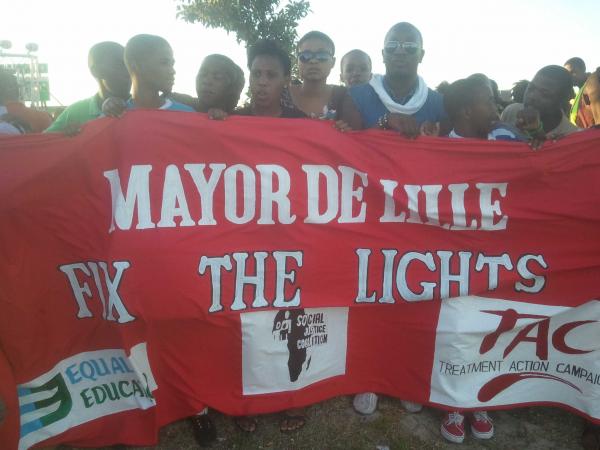

Leading protest banner at last night’s march.
12 February 2013
Night-time and Khayelitsha looks a different place to a few weeks ago. The City has repaired most of the street lights in the township’s major roads; it is noticeably brighter now. Last night Mayor Patricia De Lille joined a march organised by organisations who have been demanding that the lights be repaired.
The march of about 150 people, organised by the Social Justice Coalition, Treatment Action Campaign and Equal Education, was organised to celebrate the lights being switched back on and to demand that the City comes up with a plan to maintain the lights and build more. In June GroundUp first reported how the lights along Lansdowne Road had been broken for years. This was followed up with reports in September and January. The City blamed vandals for breaking the lights and said that they had repaired the lights in September. However, residents disputed that the lights had been fixed. Activist organisations have been pressurising Mayor De Lille to bring the lights back on and the City has now done that. Equal Education released a statement yesterday stating that as of Sunday, 88% of the lights on Lansdowne Road in Khayelitsha were working up from 8% a few weeks ago. It still remains to be seen if the lights will be maintained and if new lights will be built along currently dark parts of the major roads.
Luthando Tokota lives in RR section in Site B Khayelitsha. He said having lights on is very important because all these years living in the dark people have been getting robbed and some even get killed. “When you go to the police station to open a case for the robbery, you get asked questions such as what was the attacker wearing, what did he look like? But in most cases it’s hard to answer because things happen so fast and it’s dark, so you can’t see the person, what they look like or what they were wearing. It ends up sounding like you are lying about the incident.” Tokota hopes that all the lights in Khayelitsha will be fixed and that lights will be installed in areas where there are none.
Driving down Lansdowne Road between Mew Way and Baden Powell after dark appears safer now, both for pedestrians and drivers. Activists have been arguing that lighting up the major roads might help reduce the township’s high pedestrian fatality rate and make residents safer from crime.
Even though the protest was aimed at her, the mayor was confident enough to walk with the marchers, chatting to people individually and delivering a speech to them, before receiving a memorandum from the protesters. She wrote last week that vandalism was responsible for undoing September’s light repairs, but GroundUp has interviewed residents who say they do not recall the lights along Lansdowne Road being repaired for years. GroundUp asked De Lille about the possibility that the service delivery providers contracted by the City had failed to deliver on their contracts in September. She said non-delivery of contracts is something the City is concerned about. In the next few months she will introduce measures to make it easier for community members to ensure that sub-contractors do their job. Phumeza Mlungwana, General Secretary of the Social Justice Coalition, responded cautiously to this. She said if communities are going to be able to assist the City identify when contracts are not delivered, the City will need to provide communities with much more information.
De Lille emphasised that vandalism is a serious problem. For example, when asked about a number of broken high mast lights in the area, which provide lighting to shacks where it is impossible to build street lights, she said that a control box for the high masts had been vandalised a week ago. De Lille wants to introduce more modern systems to address this. She mentioned that she wants to look into the possibility of solar-powered lights, replacing traditional bulbs with LEDs and computer systems to detect malfunctions as soon as they occur.
Tata uKhwalo is a traditional healer. He lives and works in an open field not far from Makhaza park, one of the darkest areas in Makhaza where a lot of people get robbed. He said the lights had been off for a long time in Lansdowne Road. “It is really nice to have the lighting back on Lansdowne Road because people get stabbed and killed in that area,” he said.
Not everyone we interviewed thought lights were a priority. Theodora Luthuli said it’s unfair she hasn’t been given a chance to talk to the mayor because she has some questions for her. She complains that people do not have toilets and have to relieve themselves in the bush. “Lights are the last thing for her to attend. She must first start with the basic things such as toilets,” said Luthuli. One of the organisations at the head of the protest, Social Justice Coalition, has been spearheading a campaign for more and better toilets in Cape Town’s townships.